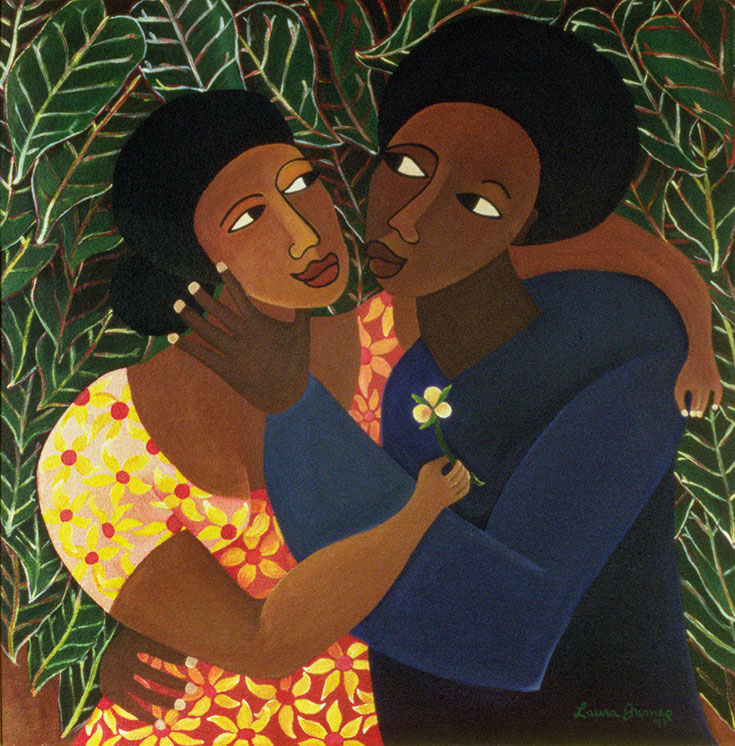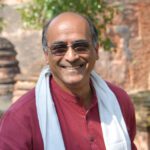My wife, Gitu, and I recently visited Kaudiyala, on the banks of the Ganga river, where we’d had our Hindu wedding in the spring of 1996. Being there again was a joyful reminder of the practice of marriage and how it has helped us grow in friendship, companionship, love, and understanding.
Over the years, we may find that love and sex are not the same, however much they may seem the same when we are younger. And making love is more than just procreation. It can be a fulfilling act of merging identification, of coming out of our physical selves. It can allow us to get a sense of merging with our loved one and the cosmos. Our experience of nonself is sensual and yet spiritual. Our bodies are beautiful manifestations of nature. To see that beauty in others, but without craving, is a way to freedom.
It was after studying and receiving the Five Mindfulness Trainings from Thich Nhat Hanh on Vulture Peak in Rajgir, India, in 1988 that I became much more attentive to my sexual behaviour and its effects on others and myself. The Five Mindfulness Trainings are Thay’s framing of the Buddhist precepts for modern times. The third training is True Love, and it’s about how to avoid sexual misconduct so as to protect the well-being of individuals, couples, families, and society.
When I began practicing True Love, the change was profound—to me and my newly forged relationships, as well as to my family and friends. The hedonistic lifestyle of my youth fell away, and healthier, happier relationships ensued. Pleasure with multiple partners had always been mutual, but I came to realize that sexual relations without love created painful mental states of attachment and clinging. There’s a deep bond between body and mind. When love is not a prerequisite for physical pleasure, what often ensues is resentment, jealousy, and anger.
Sexual attraction can be born of the physical or the intellectual. It can also be instigated by consumerism; advertising and social media water the seeds of craving. Many advertisers work on desire to sell their products, which they promise will bring us sexual prowess and partners. It’s truly fitting that many perfumes have names like Poison and Samsara!
I recall Thay (Thich Nhat Hanh) sharing with some young Vietnamese people that there are certain things we may keep secret and not share with others. There are, for example, certain parts of our body that are sacred zones and only to be shared with someone special.
When Thay encouraged me to become a monk, he suggested that the life of a celibate monastic was easier than life in a conjugal relationship. He even offered me a robe, and my head was shaved. For a while I tried that life, and I realized that if one is fully aware of one’s sexual energy when it arises and does not act on it, it can be transmuted into a spiritual and creative energy.
But I told Thay that I wanted to go through the experience of being a householder, having children, and making a livelihood in the world—and to see if I could still be happy and free. He understood and blessed Gitu and me by officiating our Buddhist wedding ceremony in the midst of a retreat in Plum Village of over a thousand people. He said this was a teaching, and he continued to support us in our marriage. When we presented our first child to the sangha, he held her lovingly, welcomed her as a “sangha baby,” and invited us to stay at Plum Village.
Sexual energy is one of the most potent and powerful energies we can experience as human beings. It’s pleasurable, yet it can also be destructive. Nurtured within love, mindfulness, concentration, and insight, sexual energy can flower into a sacred union.
The story of the dream of Mayadevi, the Buddha’s mother, where a white elephant gently placed a pink lotus into her womb, is such a poetic way of describing the sexual act of conception. It’s said that she awoke in a most pleasurable state of mind and was pregnant. This sexual intimacy in the palace of Kapilavastu offers us a way of understanding the beauty and intimacy of the relationship between Siddhartha’s father and mother.
An important part of the training of True Love is protecting children from sexual abuse. At the boys’ boarding schools I attended from a very young age, a teacher used his position of power for his own sexual pleasure. Then, at sixteen, I had an abusive interaction with a very well-known “guru,” feted by the elite of India.
I met him often at a friend’s home. Once, as thousands of devotees thronged outside, the guru called me to a dark inner room. He hugged me close, my face smothered in his frizzy hair. He was clearly sexually aroused, and soon I felt him rubbing sticky liquid around my groin. As he did this, he pontificated that I should give up my bad habits! I came out of the room in a daze and rushed home. It was years later that I understood what had happened to me and learnt how often this guru abused his followers, boys and men. It made me more intent on protecting children from sexual abuse.
The Buddha shared that there are four elements of true love, or what’s commonly known as the brahmaviharas, or the four immeasurables: maitri (loving-kindness), karuna (compassion), mudita (joy), and upeksha (nondiscrimination or equanimity).
As Thay suggested, Gitu and I recite the Five Awarenesses together at each full moon. If we’re apart, we recite them together on the phone. This recitation has helped create a harmonious and understanding relationship between us, and it’s helped us cherish the preciousness of life and our companionship.
“We are aware that understanding is the very foundation of love,” is the fourth of the awarenesses. The fifth is, “We are aware that blaming and arguing can never help us and only create a wider gap between us; that only understanding, trust, and love can help us change and grow.”
It’s said that when we marry, we become one. As we have children, that sense of oneness enlarges as a family. At our Hindu marriage ceremony solemnized on the banks of the Ganga, Gitu and I ended our seventh circumambulation around the sacred fire, signifying that we shall be each other’s best friend. As our friendship and love have grown, we’ve each come to feel that when the other is suffering, it’s our suffering, and when the other is happy, it’s our happiness.

